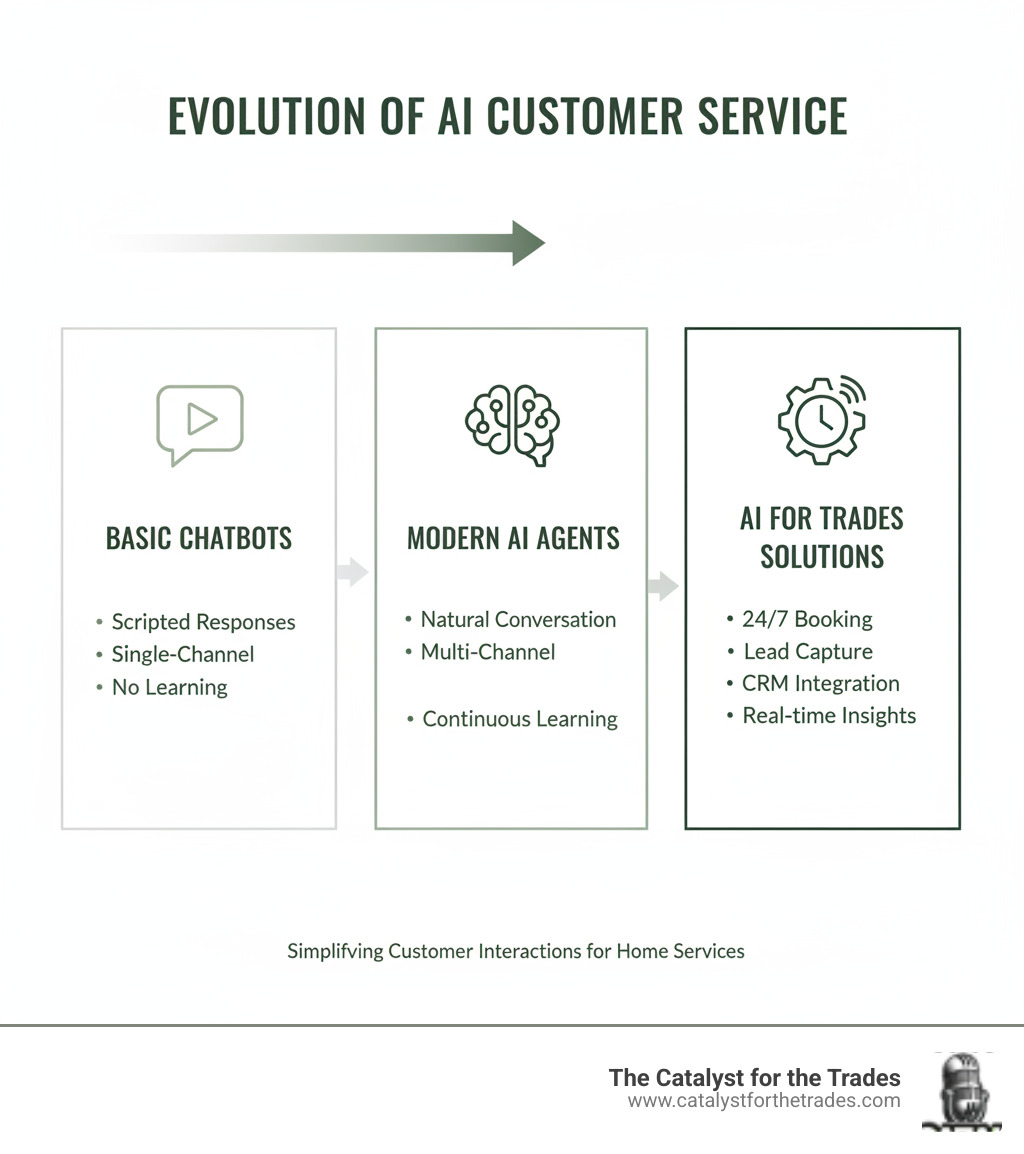Discover business acumen: core components, traits of leaders, development steps & metrics to boost decision-making and scale success.

Beyond Chatbots, Intelligent Customer Service Explained
Why AI Customer Service is Changing Home Service Operations
AI customer service uses artificial intelligence to automate and personalize customer support. By leveraging technologies like Natural Language Processing (NLP) and Machine Learning, AI agents can handle calls, texts, and online inquiries 24/7, integrating directly with your CRM and scheduling systems.
The results are significant: businesses see a 38% reduction in call handling time, a 14% increase in agent productivity, and automated appointment booking that captures leads around the clock.
Today's customers expect instant answers, whether booking an appointment at midnight or getting a quick quote. Meanwhile, your staff is often tied up with repetitive calls about pricing and availability. This gap between rising customer expectations and limited staff hours is where AI makes a difference.
Modern AI customer service is far more advanced than frustrating, script-based chatbots. These systems understand conversational context, handle complex questions, and even detect a customer's sense of urgency. For home service businesses, this technology is a growth driver, with mature AI adoption leading to 17% higher customer satisfaction and lower operational costs.
The real opportunity is to free your team from repetitive tasks, allowing them to focus on what humans do best: building relationships and solving complex problems.

What is AI Customer Service (and How Does It Really Work)?
Imagine it's 11 PM and a customer's water heater fails. With AI customer service, they get immediate answers and can even book a service call, capturing a lead you might otherwise have missed. This is AI in action: a brilliant assistant who works 24/7 to make support faster and more personal.
Unlike frustrating chatbots, modern AI uses automation for routine tasks and personalization to make customers feel heard. The latest Agentic AI systems don't just answer questions—they take action, like scheduling appointments or updating service tickets.
How AI understands and responds
When a customer calls with a vague problem like "my furnace is acting weird," the AI works like a detective. It uses query refinement to ask clarifying questions, then performs content retrieval by searching its knowledge base of your services, FAQs, and past cases. Using this information, it applies response generation to create a unique, helpful answer instead of reading from a script.
Behind the scenes, sentiment analysis detects the customer's tone—frustration, urgency, or curiosity—and adjusts its approach accordingly. Every interaction provides data-driven insights, helping the AI learn and improve, a process proven to be highly effective by research like Generative AI at Work.
The core technologies explained simply
Three core technologies make this possible:
- Machine Learning (ML) is the brain that gets smarter with each interaction, learning from past problems and solutions.
- Natural Language Processing (NLP) allows the AI to understand human speech, including slang and informal phrasing.
- Generative AI creates natural, helpful responses that sound human.
Together, these technologies create a seamless experience: NLP understands the request, ML finds the best solution, and Generative AI delivers a personalized response. This powerful combination is changing how home service businesses operate, as explored in How AI voice and chat are changing the home service game. The result is better service, more leads, and a team free to focus on high-value work.
The Transformative Benefits of AI for Your Business and Customers
Implementing AI customer service creates a ripple effect, changing daily operations and customer relationships. The most immediate benefit is 24/7 availability. Emergencies don't keep business hours, and AI ensures you can capture every lead and schedule service anytime, day or night.
This directly improves cost efficiency and scalability. AI handles routine inquiries, freeing your team from repetitive tasks and allowing your business to manage surges in demand without hiring temporary staff. The results are impressive: companies report 38% lower call handling times and a 14% jump in agent productivity. This leads to higher customer satisfaction, with mature AI adopters seeing a 17% increase.
Key benefits for your home service business
For trades businesses, these benefits are tangible:
- Increased efficiency: AI answers common questions about service areas and pricing, letting your staff focus on complex scheduling and customer relationships.
- Reduced operational costs: Automating tasks saves significant time and money. One company saved $1.3 million by having an AI agent handle 8,000 tickets.
- Lead management: AI captures, qualifies, and schedules every inquiry, ensuring no opportunity is missed after hours or during busy periods. This automated approach, as discussed in Open uping efficiency: AI lead management automation, makes your sales process bulletproof.
How customers win with AI support
Customers also see major advantages:
- Instant responses: No more waiting on hold or playing phone tag. AI provides immediate answers and can initiate the service process right away.
- Personalized experiences: AI remembers customer history and preferences, offering relevant suggestions without requiring them to repeat their story.
- Proactive support: AI can send maintenance reminders or suggest seasonal services, anticipating needs before they become problems.
- Consistency across channels: Customers receive the same quality of service whether they call, text, or use web chat. This is vital, as a survey conducted by Longitude found that 59% of customers expect businesses to use their data for personalization.
In short, AI customer service creates a better experience for your customers, your team, and your bottom line.
The AI Toolkit: Key Applications Beyond Basic Chatbots
Modern AI customer service is a versatile toolkit designed to make your business run smoother. It goes far beyond basic chatbots to include sophisticated applications that work together.

Key applications include intelligent routing to direct inquiries to the right expert, predictive support to anticipate customer needs, quality monitoring to review interactions, smart knowledge management to keep information current, and automated follow-ups for reminders and surveys.
List of key types of AI customer service tools
Here are the core tools that can transform your home service business:
- AI Agents & Voicebots by The Catalyst for the Trades: Virtual team members that handle calls, book appointments, and capture leads 24/7.
- Agent-Assist Tools (Copilots): Real-time assistants that provide human agents with customer data and suggested responses during a call.
- Intelligent Ticket Routing: AI that reads and understands customer messages to send them to the correct person or department automatically.
- Sentiment Analysis: Technology that gauges customer emotion (frustration, delight) to prioritize cases and personalize responses.
- Predictive Analytics: AI that analyzes data to forecast service needs, identify at-risk customers, and predict busy periods.
Real-world examples in the trades
In the trades, these tools deliver immediate value:
- Automated appointment scheduling: Integrates with your calendar, allowing customers to book service anytime, from any channel, without human intervention.
- Instant quotes for standard jobs: Provides immediate pricing for common services, speeding up the sales cycle and preventing lost leads.
- Dispatch status updates: Automatically sends real-time technician location updates to customers via text or email, reducing "Where's my tech?" calls.
- After-hours lead capture: Engages with website visitors and callers outside of business hours to gather information and pre-qualify leads.
These applications are revolutionizing customer communication in the trades, a topic explored in How AI is changing call handling: Brad Scruggs on the future of home service communication.
The Human + AI Partnership: Enhancing Your Team's Capabilities
The truth about AI customer service is that it's not about replacement, it's about augmentation. AI isn't coming for your team's jobs; it's coming to make them better at them. It acts as the ultimate teammate, handling repetitive tasks so your staff can focus on what humans do best: solving complex problems and building customer relationships.

This partnership empowers your agents and reduces burnout by shifting their focus to more meaningful work.
How AI improves the role of human agents
AI gives your human agents superpowers by automating administrative tasks like pulling up customer files and summarizing calls. It also provides data-driven insights in real-time, giving agents a complete picture of the customer's history and needs. Some systems even offer real-time coaching with suggestions for empathetic phrasing or solutions.
Customers still prefer humans for complex issues. A recent study found 88% of customers are satisfied with human-led interactions, and 82% of customers prefer human support over AI for issues of the same complexity. This proves AI's role is to improve human capabilities, as detailed in research showing AI delivers the best customer support when it's enhancing humans, study finds.
Creating new roles and opportunities
The AI revolution creates new, higher-value career paths:
- AI oversight professionals manage and optimize the AI systems.
- Customer experience strategists analyze customer journeys to design better service experiences.
- Escalation specialists handle the most complex and sensitive customer issues that require a human touch.
These roles are more engaging and strategic, future-proofing your team for the years to come. As we've discussed in The AI revolution in home services: How to future-proof your trades business, embracing this human-AI partnership provides a massive competitive advantage.
A Practical Guide to Implementing AI in Your Service Operations
Implementing AI customer service doesn't require a massive budget or a computer science degree. A thoughtful, step-by-step approach is key. Start by defining clear objectives, like capturing after-hours leads or reducing repetitive questions. Then, ensure your AI is trained on high-quality data—clean up your FAQs and knowledge bases. The AI should integrate seamlessly with your existing CRM and scheduling tools, and you must train your team on how it will make their jobs better, not replace them. Finally, measure performance from day one to track your success.
Best practices for implementing AI customer service
Follow these best practices for a smooth transition:
- Start small: Automate one specific area first, like appointment scheduling, and expand from there.
- Choose the right tools from The Catalyst for the Trades: Use solutions built for the home service industry that understand your specific workflows.
- Train the AI with quality data: The better the data, the better the AI's performance.
- Maintain the human touch: Ensure customers can easily reach a person for complex or sensitive issues.
- Be transparent with customers: Let them know when they're interacting with an AI. This builds trust, a strategy discussed in Smart decisions, big impact: Teasha Cable's AI strategies for better business.
Navigating challenges and ethical considerations
Be mindful of potential challenges:
- Data privacy: Choose a solution that complies with privacy regulations and secures customer data.
- Algorithmic bias: Regularly review your AI's performance to ensure it treats all customers fairly.
- Job displacement anxiety: Address team concerns by highlighting how AI creates opportunities for higher-value work.
- Ensuring a human handoff option: An easy way to reach a human is essential. 47% of consumers get frustrated by a lack of human agents.
- Customer frustration: Implement feedback mechanisms to quickly identify and fix issues where the AI misunderstands or provides incorrect information.
As the Zendesk Customer Experience Trends Report 2024 notes, the goal is to make human connections more meaningful, not replace them.
Frequently Asked Questions about AI in Customer Service
It's natural to have questions about implementing AI customer service. Let's address the most common concerns for home service businesses.
Will AI replace my customer service team?
No. The goal of AI is augmentation, not replacement. AI handles repetitive tasks like basic scheduling and pricing questions, freeing your human team to focus on complex problem-solving and building customer relationships. Studies show customers still prefer humans for complex issues, with 88% satisfied with human-led interactions versus only 60% for AI-only support. Your team's role becomes more valuable, not obsolete.
Is AI customer service too expensive for a small-to-medium trades business?
Not anymore. Modern AI solutions, including those from The Catalyst for the Trades, often use consumption-based pricing, meaning you pay per resolution or conversation. There are no massive upfront costs. The return on investment is typically fast, driven by increased efficiency, 24/7 lead capture, and reduced operational overhead. The cost savings from automating thousands of routine inquiries can be substantial.
What's the difference between a chatbot and an AI agent?
The difference is significant. A basic chatbot follows a rigid, pre-programmed script and often fails when questions deviate from it, leading to customer frustration.
An AI agent, like those from The Catalyst for the Trades, uses machine learning and generative AI to understand context, learn from conversations, and hold natural dialogues. It can handle complex requests, ask clarifying questions, and perform actions like scheduling appointments, making it a truly helpful virtual assistant.
Conclusion: The Future of Service is Intelligent and Human-Centric
AI customer service is more than a buzzword; it's a fundamental shift in how home service businesses operate. It offers a solution to missed after-hours leads, repetitive inquiries, and team burnout.
The benefits are clear: 24/7 availability, a 38% reduction in call handling time, and a 14% increase in agent productivity. This means instant responses for your customers and greater efficiency for your business.
Crucially, this technology amplifies the human touch, not replaces it. By automating routine tasks, AI allows your team to focus on high-value interactions that build customer loyalty. This human-AI collaboration provides a significant competitive edge, allowing you to capture leads around the clock while your competitors play phone tag.
The future outlook is clear: AI will soon be part of nearly all customer interactions. Businesses that accept this shift today will lead their markets tomorrow. At The Catalyst for the Trades, we've seen this change firsthand. It's about creating a smarter, more sustainable way to grow, a topic discussed by leaders like Paul Redman in Future-proofing contracting: Paul Redman on tech, AI, and the new customer experience.
The future of service is both intelligent and human-centric. By embracing AI, you're investing in a better experience for your customers and a stronger future for your business.
Ready to take the next step? Explore more strategies for your trades business and find how we can help you harness the power of AI for your home service operation.

Discover how leading home‑service companies are leveraging AI, subscription models, and digital‑first strategies.
Learn why private equity, automation, and customer‑centric tech are reshaping the trades.
Episodes you may like


Lead your crew to victory! Master essential contractor leadership strategies for project success, safety, and team empowerment.

Harness real-time data with cortex pulse analytics. Get AI-driven insights, detect issues instantly, and make smarter business decisions.
.png)


